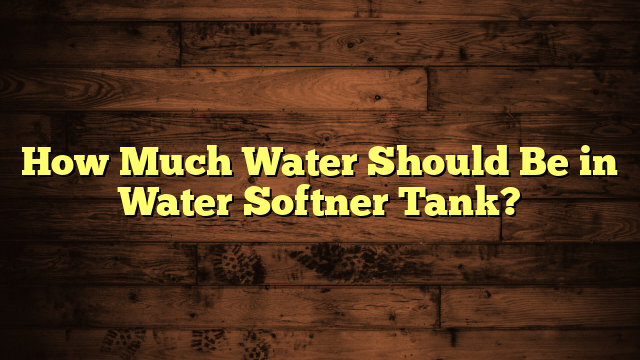What Is Best for Water Softner?
Did you know that nearly 85% of U.S. households have hard water, which can lead to various plumbing issues and reduced appliance efficiency? When it comes to choosing the best water softener, you'll find that it's not a one-size-fits-all solution. Factors like your water hardness level, household size, and budget play a considerable role in this decision. Understanding the different types available and their specific benefits can help you determine which option suits you best. What you choose could considerably impact your water quality and overall home maintenance.
Key Takeaways
- Consider ion exchange softeners for effective removal of hard minerals, replacing them with sodium ions for improved water quality.
- Evaluate salt-free systems if you prefer to condition water without removing minerals, reducing scale buildup and maintaining mineral content.
- Assess initial investment versus long-term savings, as higher upfront costs may lead to greater efficiency and reduced maintenance expenses over time.
- Prioritize system efficiency ratings to ensure lower energy and water usage, which can significantly impact operational costs in the long run.
- Research and compare customer reviews and professional consultations to make an informed decision based on your specific water needs and conditions.
Understanding Hard Water
Understanding hard water is essential for finding the best solution for your water softening needs. Hard water contains high levels of calcium and magnesium ions, which can lead to several hard water effects.
You'll notice scale buildup on faucets and appliances, reduced soap efficiency, and even potential damage to plumbing systems. To address these issues, you need to measure water hardness accurately.
Water hardness measurement typically involves testing the concentration of calcium and magnesium in your water supply, usually expressed in parts per million (ppm) or grains per gallon (gpg).
A hardness level of 0-60 ppm is regarded as soft, while 120-180 ppm indicates hard water. If your readings exceed these levels, it's vital to take into account a water softener to mitigate the detrimental effects of hard water.
Types of Water Softeners
Once you've determined your water hardness levels, the next step is selecting the right type of water softener to address your needs.
Understanding the various options available can make a significant difference in your water quality. Here are four common types of water softeners you might consider:
- Ion Exchange Softeners: These are the most widely used systems, replacing hard minerals like calcium and magnesium with sodium ions, thereby effectively reducing hardness.
- Magnetic Softeners: This type uses magnetic fields to alter the properties of hard water minerals, preventing them from scaling and reducing their impact on plumbing and appliances.
- Salt-Free Softeners: Rather than removing minerals, these systems condition water to prevent scale buildup, using a process of crystallization.
- Reverse Osmosis Systems: While primarily used for filtration, these systems can also soften water by removing a wide range of contaminants, including hardness-causing minerals.
Choosing the right system depends on your specific needs and water conditions.
Each type has its advantages, so consider them carefully to find the best fit for your home.
Salt-Based Systems
Salt-based systems, known for their effectiveness, are a popular choice for many homeowners dealing with hard water issues. These systems utilize a process called ion exchange, where calcium and magnesium ions in hard water are replaced with sodium ions from the salt used in the system. The salt types you choose can impact the system's efficiency, with options like rock salt, solar salt, and evaporated salt available.
During the regeneration process, the system cycles through a sequence to restore its softening capabilities. First, it flushes out the collected hardness minerals, then it draws in a concentrated salt solution to recharge the resin beads. This step is essential, as it guarantees the system continues to effectively soften water.
You'll want to monitor your salt levels regularly, as running low can hinder performance. Furthermore, the choice of salt type can also affect the frequency of regeneration needed.
Salt-Free Alternatives
Exploring salt-free alternatives can provide an effective solution for homeowners seeking to mitigate hard water issues without the use of sodium.
These systems work by using various methods to alter the properties of hard minerals, making them less problematic. Here are four popular options:
- Magnetic Conditioners: These devices use magnets to alter the behavior of hard water minerals, reducing scale buildup in pipes and appliances.
- Template Systems: These units crystallize hardness minerals, preventing them from adhering to surfaces while allowing them to pass through your plumbing.
- Electronic Descalers: These systems send electrical signals through your plumbing to change the structure of hard minerals, reducing scale formation without the addition of chemicals.
- Coconut Shell Carbon Filters: These filters can reduce some hardness minerals while also improving water taste and odor, providing a dual benefit.
While salt-free solutions don't remove hardness minerals entirely, they can considerably reduce their negative effects.
Understanding your specific water quality and needs will help you choose the best system for your home.
Benefits of Water Softeners
Water softeners offer a range of benefits that can greatly enhance your home's water quality. By removing hard minerals like calcium and magnesium, they prevent scale buildup in your plumbing and appliances, which can lead to costly repairs.
You'll notice improved efficiency in your water heater and dishwasher, ultimately saving you money on energy bills.
The health benefits of using softened water are also significant. Softer water can lead to better skin hydration and reduced irritation for sensitive skin, making your daily showers more pleasant.
Furthermore, you'll find that soaps and detergents work more effectively, which means you can use less product while achieving the same cleaning results.
From an environmental impact perspective, water softeners can reduce the amount of soap and detergents you need, leading to less chemical runoff entering the ecosystem.
This contributes to healthier waterways and reduces the strain on wastewater treatment facilities.
Factors to Consider
When choosing a water softener, several essential factors come into play that can greatly influence your decision. Understanding these aspects will help you select the right system for your needs, guaranteeing peak performance and softener efficiency.
- Water Hardness Level: Measure your water hardness using a testing kit. This will determine the type of softener you'll need.
- Flow Rate: Assess your household's water consumption. A system with adequate flow rate guarantees a consistent supply of softened water.
- Regeneration Type: Choose between timer-based or demand-initiated regeneration. Demand-initiated systems are often more efficient, as they regenerate only when necessary.
- Salt Type: Different salts can affect the efficiency of your softener. Consider using high-purity salt for best results.
Installation and Maintenance
Proper installation and maintenance are fundamental for guaranteeing your water softener operates effectively and lasts for years.
Start with installation tips: choose a location near the main water supply line and a power source. Verify you have enough space for the unit and its brine tank. Follow the manufacturer's guidelines for connecting the inlet and outlet pipes, and double-check all fittings to prevent leaks.
Once installed, maintaining your water softener is vital. Create a maintenance schedule to check essential components. Regularly inspect the brine tank, and refill it with salt as needed—generally every 4-6 weeks, depending on usage.
Clean the resin tank every 6-12 months to remove any buildup that could hinder performance. Additionally, monitor the softener's settings and adjust the regeneration frequency based on water hardness and consumption.
Test your water periodically to verify the system is functioning properly. If you notice any issues, consult the manual or a professional.
Cost Analysis
Understanding the costs associated with a water softener is essential for making an informed decision. A thorough cost analysis will help you evaluate your options and find the best solution for your needs. Here are four key factors to take into account:
- Initial Purchase Price: The cost of the unit varies based on features and capacity.
- Installation Costs: Professional installation adds to your initial investment but guarantees proper setup.
- Maintenance Expenses: Regular maintenance, including salt refills and system checks, should be budgeted.
- Operational Costs: Reflect on the ongoing costs of water and energy consumption for the system's operation.
When you conduct a cost comparison of different systems, look beyond initial expenses. The long-term savings from reduced energy bills and extended appliance lifespan can offset your initial investment.
A well-chosen water softener can lower maintenance costs on plumbing and appliances, saving you money in the long run. By analyzing these costs thoroughly, you can make a more informed choice, guaranteeing that your investment pays off over time.
Frequently Asked Questions
Can Water Softeners Remove Bacteria or Viruses From Water?
Water softeners aren't designed for bacterial removal or virus filtration. They primarily address hardness minerals, so for effective pathogen removal, consider using a dedicated filtration system or water treatment method specifically targeting bacteria and viruses.
How Often Should I Refill the Salt in My System?
You wouldn't want a salt shortage during a softening crisis! Typically, you should check and refill your water softener's salt every 4-6 weeks, depending on the salt types and your household's water usage.
Are There Any Eco-Friendly Alternatives to Traditional Water Softeners?
You can explore salt-free systems, which use natural alternatives like citric acid or potassium-based methods. These eco-friendly options reduce scale buildup without the environmental impact of traditional water softeners, promoting healthier water for your home.
What Is the Lifespan of a Typical Water Softener System?
A typical water softener system lasts 10 to 15 years, depending on water softener maintenance and lifespan factors like water quality, usage, and the system's build quality. Proper care can extend its longevity considerably.
Can Hard Water Affect My Plumbing Even With a Softener Installed?
Nearly 85% of U.S. homes have hard water effects that can still impact your plumbing, even with a softener installed. Regular plumbing maintenance is essential to prevent scaling and prolong the lifespan of your system.
Conclusion
In choosing the best water softener for your home, picture the gleaming fixtures and soft, silky skin that come from softened water. Whether you opt for a salt-based system, dissolving hard minerals like magic, or a maintenance-free, salt-free alternative that prevents scale buildup, the right choice can transform your daily life. Remember to weigh factors like efficiency, installation, and cost, ensuring you invest in a solution that meets your specific needs and enhances your water quality.







